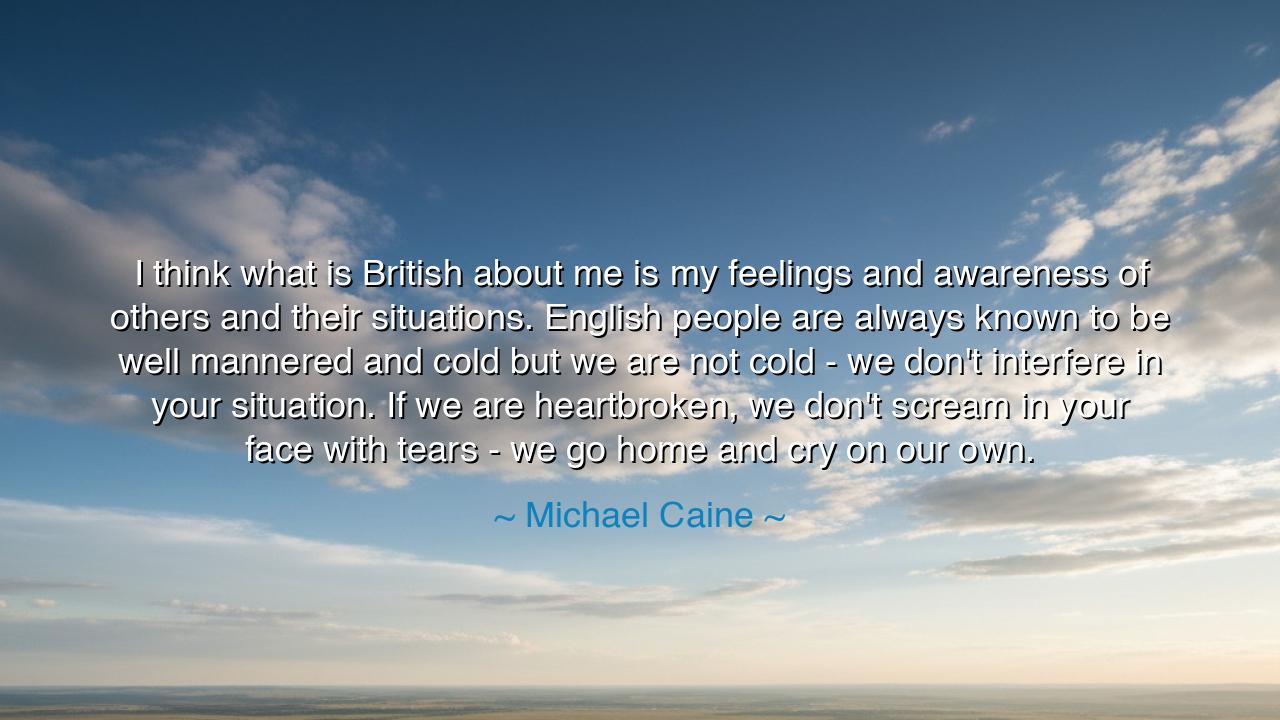
I think what is British about me is my feelings and awareness of
I think what is British about me is my feelings and awareness of others and their situations. English people are always known to be well mannered and cold but we are not cold - we don't interfere in your situation. If we are heartbroken, we don't scream in your face with tears - we go home and cry on our own.






There are certain words that echo not only through the mind, but through the soul of a people. So it was when Michael Caine, one of Britain’s most enduring sons, spoke these gentle yet profound words: “I think what is British about me is my feelings and awareness of others and their situations. English people are always known to be well-mannered and cold but we are not cold — we don’t interfere in your situation. If we are heartbroken, we don’t scream in your face with tears — we go home and cry on our own.” Beneath these words lies not mere reflection on manners, but a meditation on dignity, restraint, and empathy — the quiet virtues that have shaped a culture, and the deep humanity hidden beneath calm composure.
Caine, in his wisdom, speaks not to boast of Britishness, but to reveal the inner warmth behind reserve. The world often mistakes silence for coldness, or self-control for lack of feeling. Yet what he describes is the ancient art of emotional discipline — the ability to feel deeply without demanding that the world share in one’s turmoil. This is not repression, but reverence — a respect for the private sanctity of emotion. The English manner, as he describes it, honors the boundary between self and other. It says: I will not burden you with my pain, nor will I intrude upon yours, but know that I feel, and I understand.
This sentiment finds its roots in the long history of the British character, forged in centuries of endurance and quiet strength. On an island often wrapped in fog and rain, people learned to find warmth not in outward display, but in the steadfast hearth of self-restraint. It is the same spirit that carried Londoners through the Blitz, when, as bombs fell, the people queued calmly for bread and tea. They did not weep in the streets, but rebuilt them the next morning. They carried their grief inward, transforming sorrow into solidarity. Caine’s words, then, are not about emotional coldness — they are about courage expressed through composure, about strength disguised as stillness.
History offers countless mirrors of this truth. Consider Queen Elizabeth I, who, upon learning of the death of her beloved Leicester, showed no tears before her court. Only in private did she weep, her pain unseen but no less real. For she understood that the ruler’s composure was the kingdom’s stability. Or think of Sir Winston Churchill, who, during Britain’s darkest hours, spoke to his people not of despair, but of resolve — “We shall fight on the beaches…” — even while he carried the weight of a nation’s fear within his chest. These figures, like Caine, embody that distinct British empathy, which does not shout its compassion, but practices it through endurance, through quiet understanding, through the grace of not making another’s pain about oneself.
Caine’s reflection also reveals a timeless truth about emotional maturity. To “go home and cry on our own” is not weakness, but self-awareness — the understanding that emotion, when sacred, must sometimes be tended in solitude. In an age where feelings are often paraded and validation is sought from the crowd, his words remind us that healing begins in silence. There is strength in not demanding witnesses to our sorrow. There is beauty in private mourning, for it allows the heart to regain dignity and the spirit to find its own rhythm of recovery.
Yet, there is also compassion in his restraint. When he says that the English “do not interfere in your situation,” he speaks of respect — the kind of empathy that gives space, not advice; presence, not performance. True kindness, the ancients would say, is not in rushing to fix what is broken, but in standing near, ready to help when asked. The British way, as Caine describes it, is the art of giving others the freedom to feel without intrusion — a form of emotional courtesy that stems not from distance, but from deep awareness of others.
The lesson, then, is not only cultural but universal: strength and sensitivity need not shout to be true. The one who holds his pain quietly may love just as deeply — perhaps even more so — than the one who wails aloud. There is virtue in self-containment, in honoring both your own feelings and the peace of others. But there is also a call to balance: feel fully, but wisely; express sincerely, but respectfully; empathize deeply, but without trespass.
So let these words of Michael Caine serve as a reminder to all generations: that grace is not found in noise, but in depth; that true empathy is measured not in display, but in understanding. When you are heartbroken, do not fear your tears — but if you must, go home and cry on your own. In that quiet space, your dignity will not diminish your emotion; it will ennoble it. For the strongest hearts are not those that never break, but those that break silently, heal steadfastly, and emerge — as the English have through centuries — calm, kind, and unyieldingly human.






AAdministratorAdministrator
Welcome, honored guests. Please leave a comment, we will respond soon